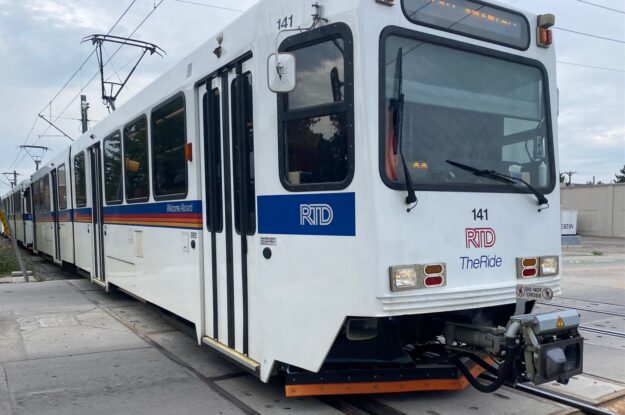Widgetized Section
Go to Admin » Appearance » Widgets » and move Gabfire Widget: Social into that MastheadOverlay zone
State lawmakers give first nod to Colorado passenger rail system

A light rail train crosses West 13th Avenue near Pecos Street in Denver on Aug. 20, 2022 (Quentin Young/Colorado Newsline).
Colorado lawmakers gave initial approval on Wednesday to a bill that would provide a $57 million annual boost to the state’s efforts to develop a passenger rail system, paid for by a new fee on rental cars.
Though a relatively small sum, the funds raised by Senate Bill 24-184’s fees — $2 per day for electric vehicles and $3 per day for gas-powered models — could play a key role in helping the state secure billions in funding from the federal government for projects like Front Range Passenger Rail and expanded service to mountain communities, state officials told the Senate Transportation and Energy Committee.
“The dollars here will really help us to compete effectively for those federal dollars that were specifically for rail,” said Shoshana Lew, director of the Colorado Department of Transportation. “It’s not a matter of whether those get spent. It’s a matter of whether they get spent here or in places like Texas and California.”
A bipartisan infrastructure law passed in 2021 included $66 billion in funding for freight and passenger rail projects. Colorado’s Front Range Passenger Rail District, created by the Legislature in 2021 to reestablish passenger service along the Interstate 25 corridor, took what state leaders say was an important step in securing funding when it was accepted into the Federal Railroad Administration’s Corridor Identification and Development Program last year.
But passenger rail proponents say the state has more to do to prove that it’s serious about the project. They say it should begin making necessary infrastructure and safety improvements and ante up the matching funds the federal government may require for key grants. Officials acknowledged Colorado’s last big transportation funding overhaul, Senate Bill 20-260 in 2020, didn’t anticipate the historic opportunity for rail funding that Congress would enact a year later.
“What happened with respect to rail in the (infrastructure law) exceeded our expectations,” Lew said. “We did not have the same kind of investment in rail in that package. So this bill will really complement SB-260 by filling that gap.”
“A whole suite of of solutions should be on the table for reducing congestion on highways,” said Senate President Steve Feinberg, a Boulder Democrat and SB-184 sponsor. “That flexibility doesn’t exist nearly as much right now.”
Andy Karsian, the Front Range rail district’s general manager, estimated in December that the project would cost between $2 billion and $6 billion, depending on the level of service, and the line could be operational “within the next decade.” The district’s board could vote soon on whether to refer a tax measure to the ballot later this year, or in 2026.
Fenberg and other state leaders have expressed hope that federal passenger rail funding could serve as a catalyst for another long-anticipated transit project — the completion of the Regional Transportation District’s B Line between Denver and Boulder, which was first approved as part of the FasTracks package in 2004 but has faced repeated delays and is currently not scheduled to begin service until 2042.
The intercity route selected by Front Range Passenger Rail would use the same track as the B Line’s commuter trains, and SB-184 would formally require RTD, CDOT and the rail district to consider a new legal entity or intergovernmental agreement with the goal of accelerating the segment’s completion.
“We’re intentionally trying not to be overly prescriptive in the bill,” said state Sen. Janice Marchman, a Democrat from Loveland and bill sponsor. “(We) want all of us to think as creatively and innovatively as possible to compete for federal investment and put these important projects back on track.”
The Transportation and Energy Committee advanced SB-184 on a party-line 5-2 vote, with Democrats in favor of and Republicans opposed to the measure. The bill will next appear before the Senate Finance Committee.
Democrats hold large majorities in both chambers of the Legislature.
Editor’s note: This story first appeared on Colorado Newsline, which is part of States Newsroom, a nonprofit news network supported by grants and a coalition of donors as a 501c(3) public charity. Colorado Newsline maintains editorial independence. Contact Editor Quentin Young for questions: info@coloradonewsline.com. Follow Colorado Newsline on Facebook and Twitter.


